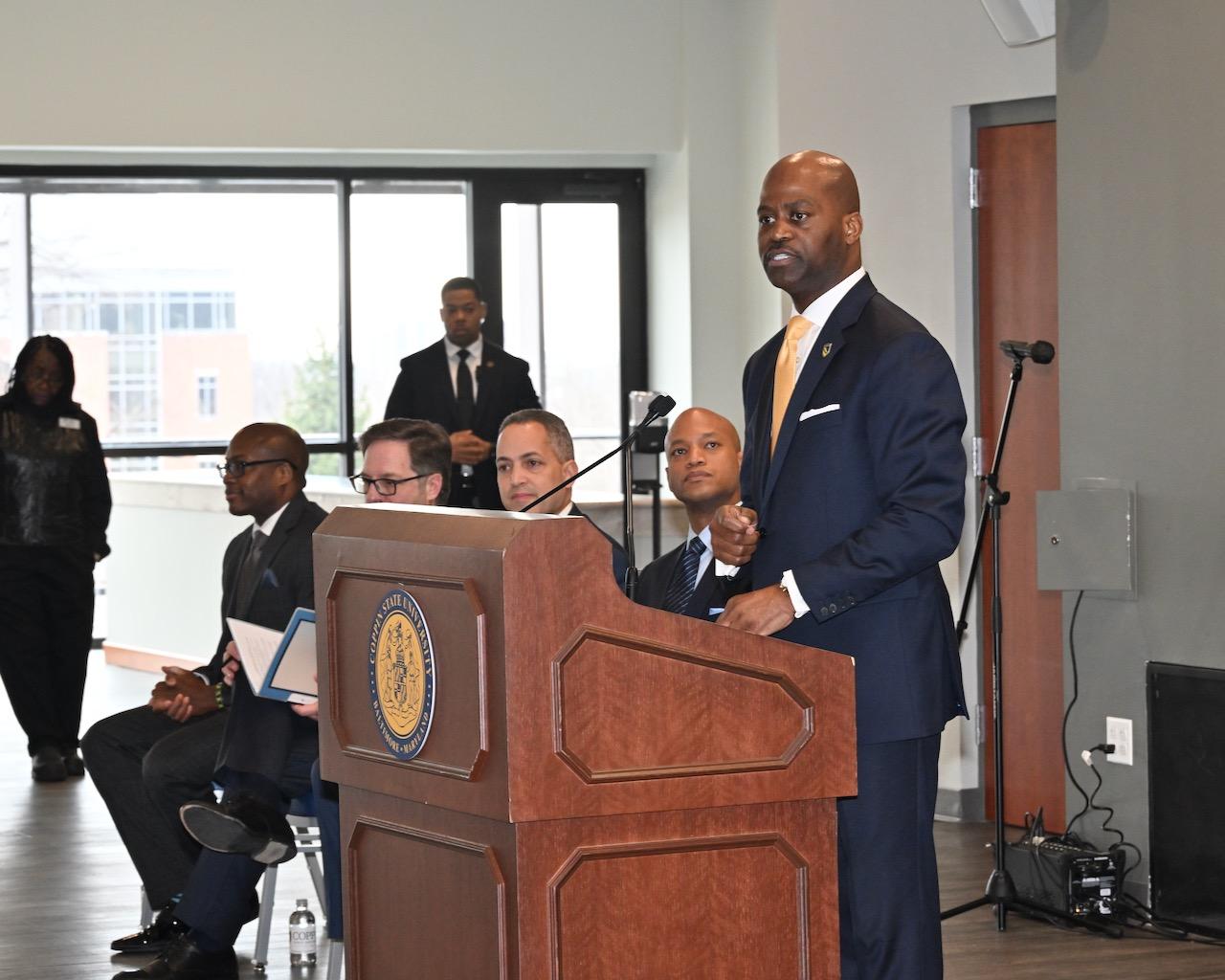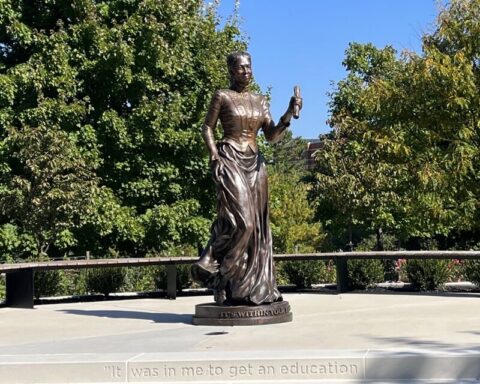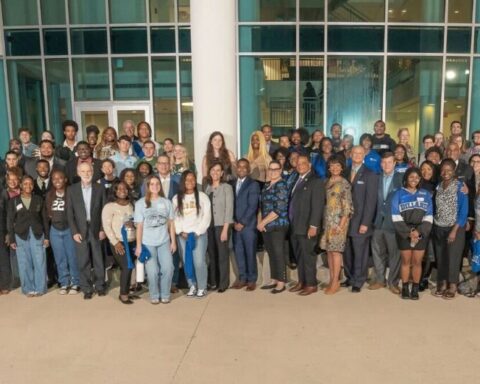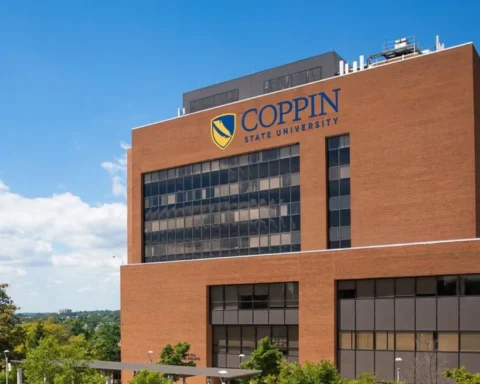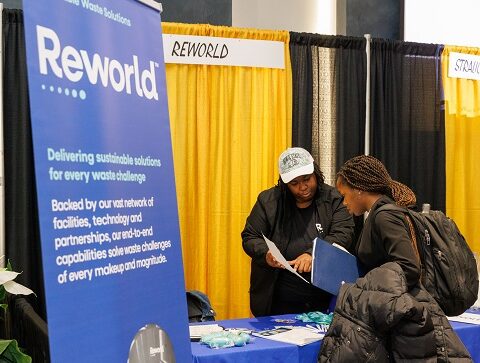Courtesy of Coppin State University
Coppin State University and the U.S. Department of Commerce today announced the launch of ConnectEagle Nation, a collaborative broadband internet pilot program that will improve connectivity and access for economically disadvantaged and underserved communities in West Baltimore.
ConnectEagle Nation will serve communities along the West North Avenue Corridor, utilizing a $3.9 million federal grant from the U.S. Department of Commerce National Telecommunications and Information Administration, to provide resources, training, and access to affordable broadband internet service.
“The internet and mobile technology are critical tools for accessing and sharing information every day. Socioeconomic status should not determine access, or opportunities for individuals or our communities, in Baltimore or anywhere else,” said Anthony L. Jenkins, president of Coppin State University. “We appreciate our local, federal, and business partners who are committing their funds and expertise to this project. We look forward to a dynamic collaboration that will make great progress in closing the digital divide in West Baltimore.”
Department of Commerce Deputy Secretary Don Graves, U.S. Senator Ben Cardin (D-MD), U.S. Senator Chris Van Hollen (D- MD), Rep. Kweisi Mfume (D-MD), and Maryland Governor Wes Moore joined President Jenkins for the announcement.
“Establishing this level of connectivity in Baltimore will help empower our communities, improve education, and promote skills training and workforce development to help grow our economy,” said Governor Moore. “Every Marylander deserves access to high-speed internet, and this is exactly the kind of partnership and innovative initiative we need to help close the digital divide.”
“Every Marylander deserves affordable, reliable access to the internet and the opportunity to participate in the 21st century economy. With this federal investment we fought to secure, Coppin State will not only be able to provide underserved communities with the physical tools to get online, but will also help equip Baltimoreans with the skills they need to take full advantage of those tools,” said Senator Van Hollen. “The ConnectEagle Program is a smart approach to expanding equitable broadband access, and I’ll keep working to invest in efforts like this until every community in our state is connected to high-speed internet.”
The Federal Communications Commission estimates 19 million people do not have reliable access to broadband. The Congressional Research Service found that 10 percent of adults in the United States did not use internet in 2019, and that those individuals were disproportionately people of color; adults over the age of 50; earned a household income of less than $50,000 annually; and had not graduated from high school.
“High-speed Internet service is going to create opportunities, increase productivity, and improve lives, particularly in communities that have too often been left behind,” said Deputy Secretary of Commerce Graves. “At the Commerce Department, we’re committed to seeing investments from initiatives like the Connecting Minority Communities program create opportunities for good jobs supported by equitable hiring, fair compensation, safe workplaces, and the tools and training needed for long-term success.”
“The Internet is essential for access to work, to education, to healthcare, and to justice,” said Assistant Secretary of Commerce for Communications and Information Alan Davidson. “Our Connecting Minority Communities program is about equipping students and the surrounding communities with the skills, the devices, and the capacity needed to reap the full benefits of our digital economy.”
Census Data shows residents in Baltimore are mostly Black, and nearly 30 percent of households in West Baltimore are without a computer. In addition, roughly 46 percent of households are without a broadband subscription.
“The digital divide is real. It impacts whole communities of school children, job seekers, healthcare workers, care providers, and so many others who fall on the wrong side of digital access. Leveraging federal funds to ensure more of our neighbors have access to digital power is a victory for all of Maryland and America. This is more good news for Maryland’s 7th Congressional District,” said Congressman Kweisi Mfume. “I applaud Coppin State University for leading the effort to level the playing field here.”
ConnectEagle Nation seeks to provide communities surrounding Coppin, including the Mondawmin, Sandtown/Winchester, and Penn North neighborhood, access, outreach, equipment, and support that will lead to greater use of broadband services.
Coppin students will be recruited to become Digital Navigators who will help low-income community members locate affordable broadband services and devices. They will also assist community members with learning to use broadband-enabled technology to foster greater digital inclusion. Digital Navigators will be trained by Enoch Pratt Free Library.
The Coppin State University College of Health Professions will partner with the Baltimore County Health Department, Baltimore County Local Health Improvement Coalition and the Outreach, Worship and Education Center to conduct a health and connectivity needs assessment for the Lochearn, Milford Mill and Woodlawn communities. This initiative will help the University and the Baltimore County Department of Health learn more about disparities in health care access and the role technology can play in addressing those inequities and improving accessibility through multiple avenues, including telehealth service delivery options.
There are also plans for a new Cyber Apprenticeship Program, as well as a committee to map services and analyze community readiness and needs for broadband access.
“Coppin State University is an HBCU with an established legacy of academic merit, but the institution has taken on a paramount role of leadership by creating the Connect Eagle Nation Program,” said U.S. Senator Ben Cardin. “From healthcare to homework, having a reliable internet connection has become critical in our everyday lives. This program will provide everyone – regardless of zip code – the access they need to excel.”
Partners for the ConnectEagle Nation program include: Baltimore City Government, Baltimore County Government, Comcast, the Enoch Pratt Free Library, Npower, the National Forum for Black Public Administrators, and Wilson Innovative Solutions.

